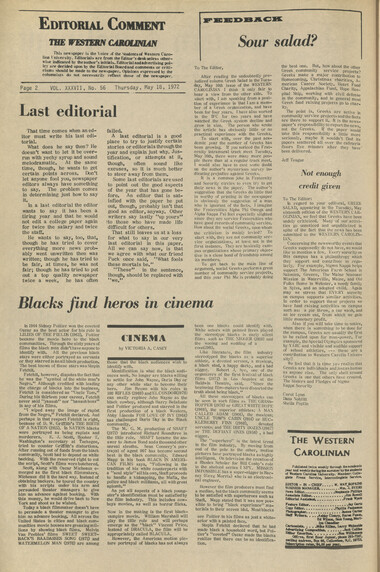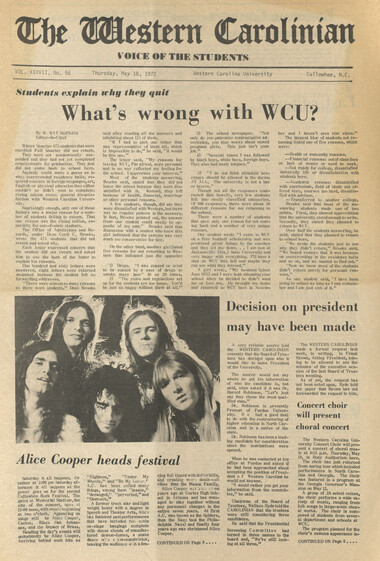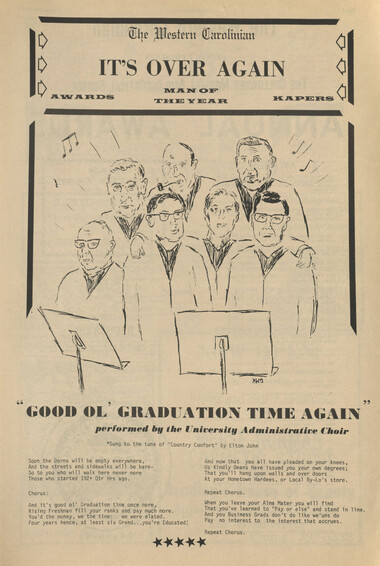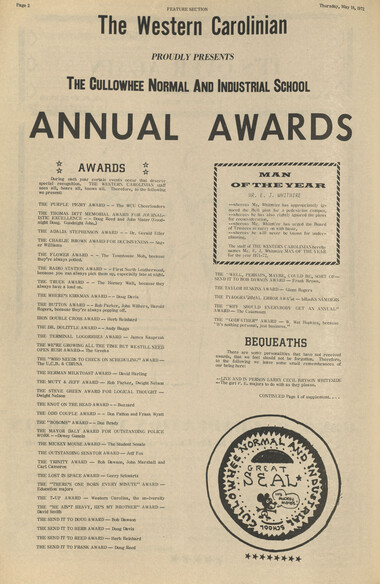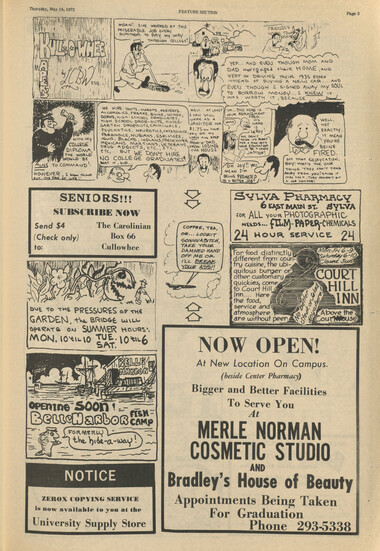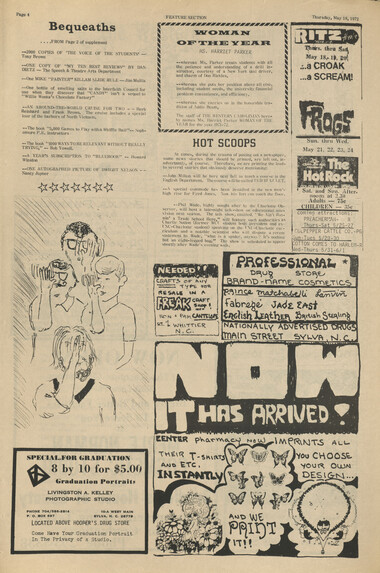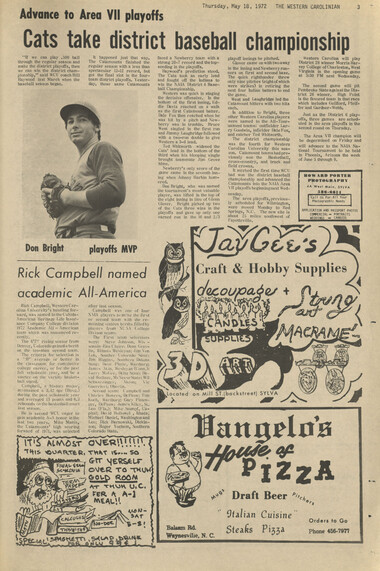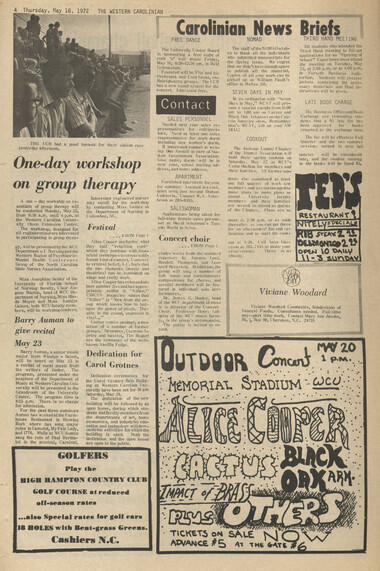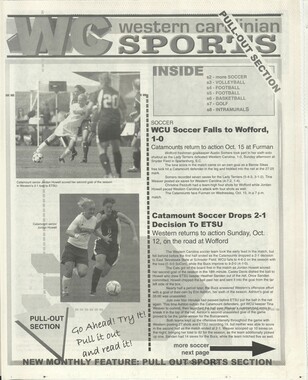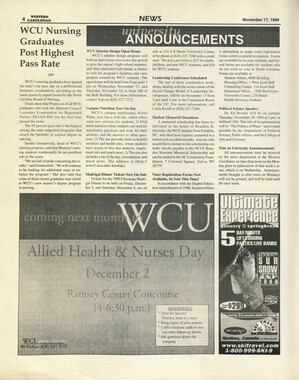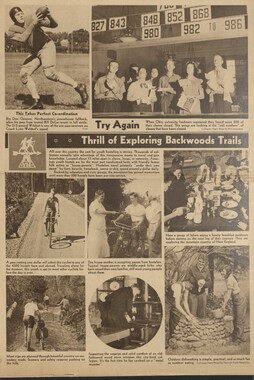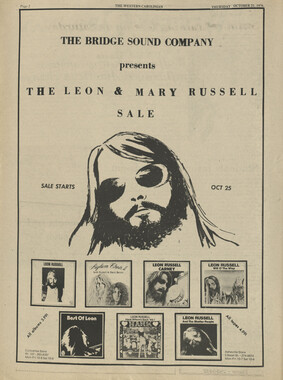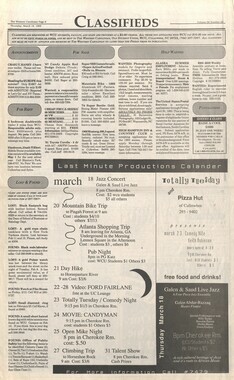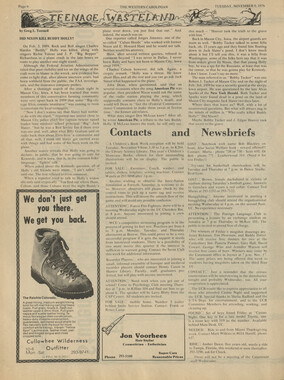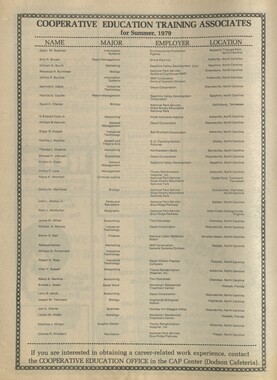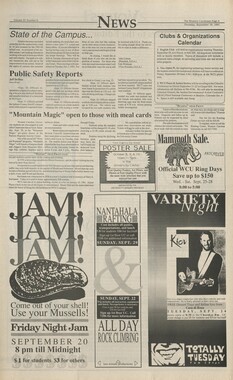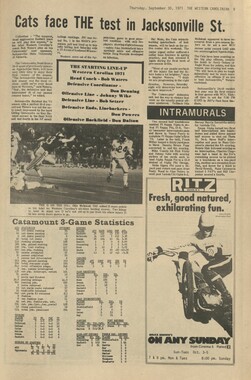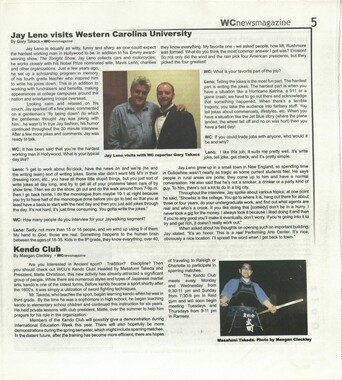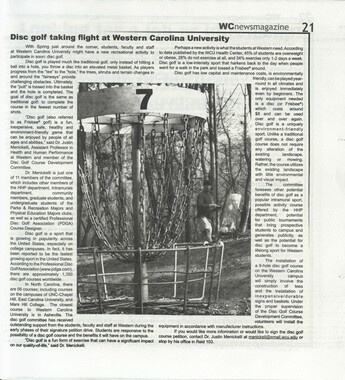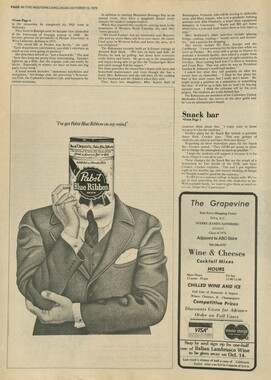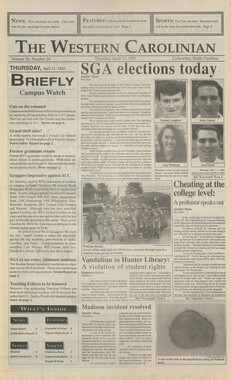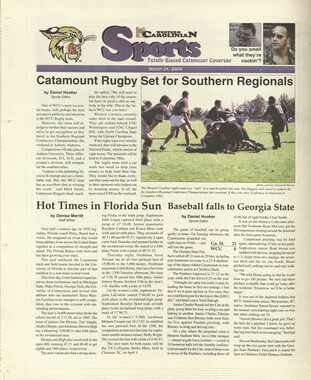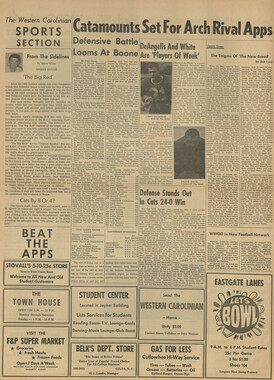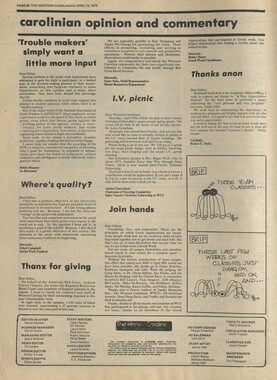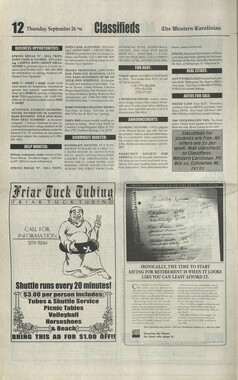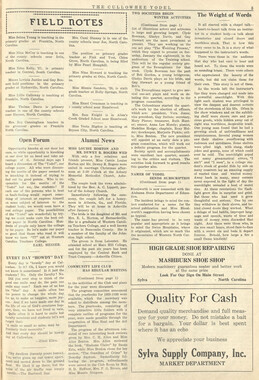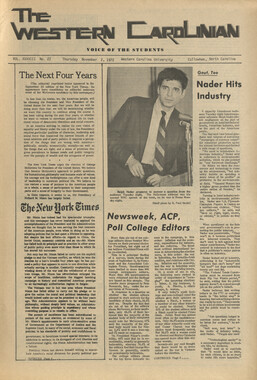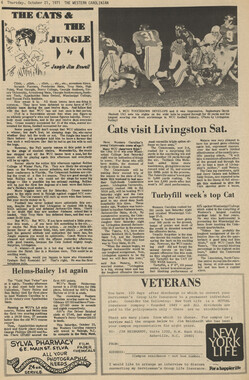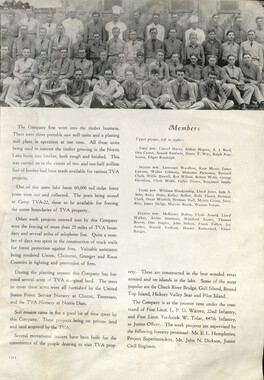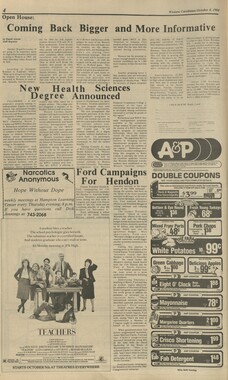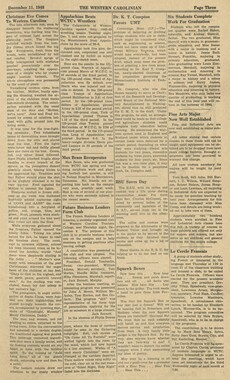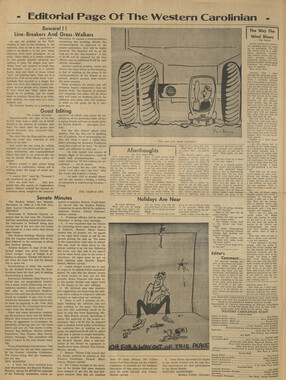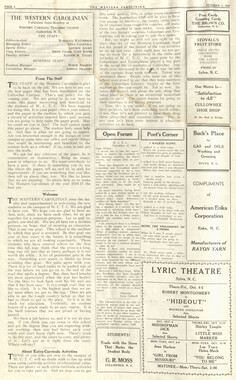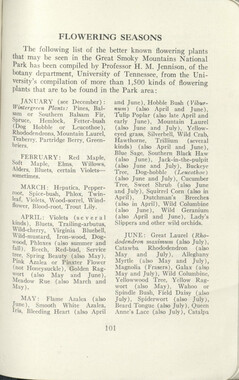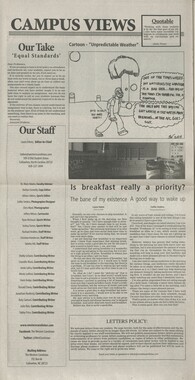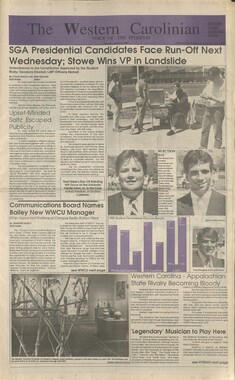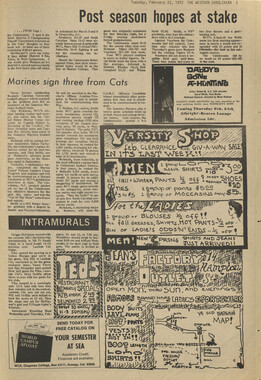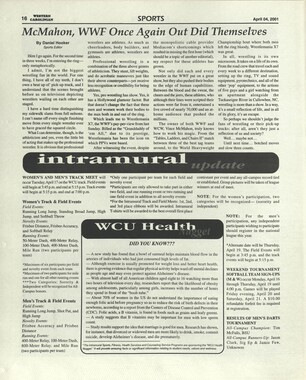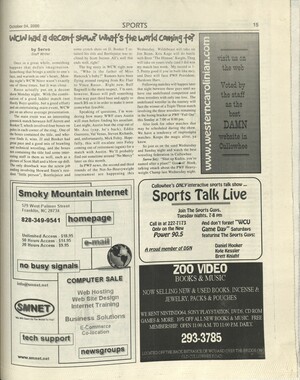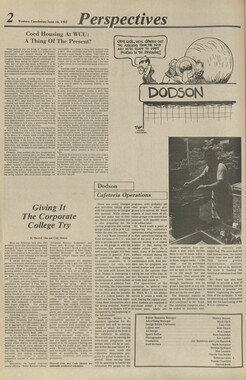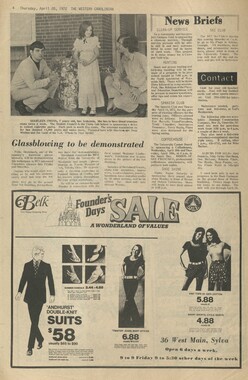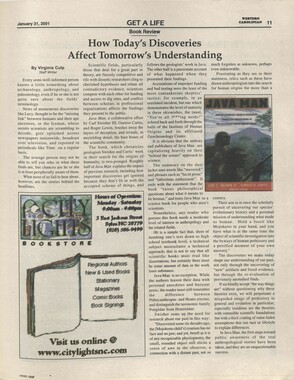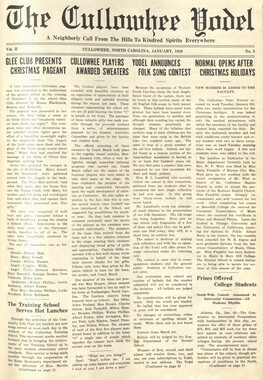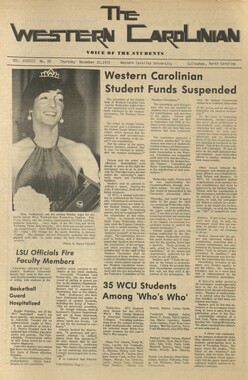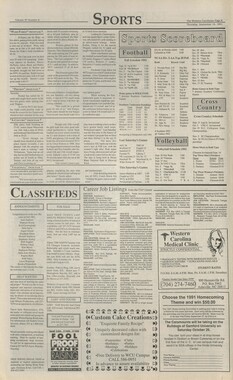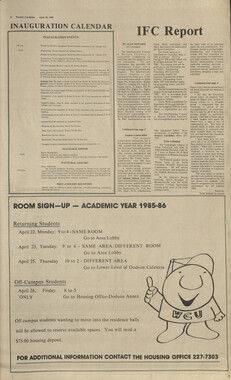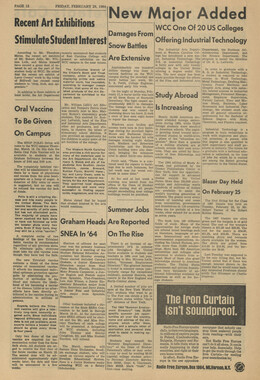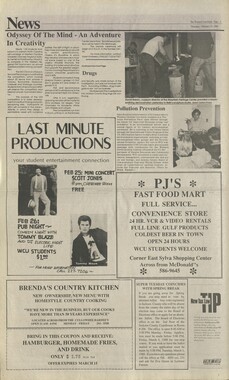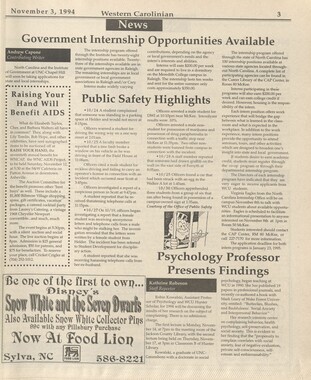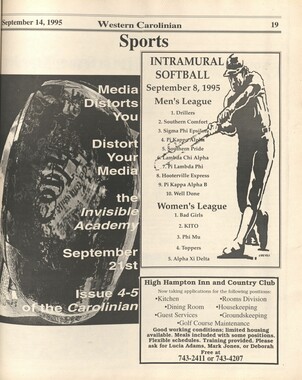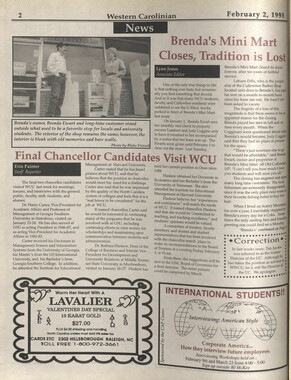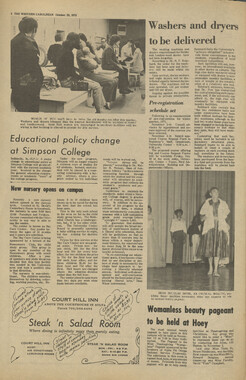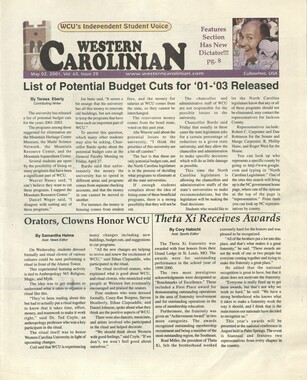Western Carolina University (21)
View all
- Canton Champion Fibre Company (2308)
- Cherokee Traditions (291)
- Civil War in Southern Appalachia (165)
- Craft Revival (1942)
- George Masa Collection (137)
- Great Smoky Mountains - A Park for America (3080)
- Highlights from Western Carolina University (422)
- Horace Kephart (973)
- Journeys Through Jackson (159)
- LGBTQIA+ Archive of Jackson County (89)
- Oral Histories of Western North Carolina (318)
- Picturing Appalachia (6617)
- Stories of Mountain Folk (413)
- Travel Western North Carolina (153)
- Western Carolina University Fine Art Museum Vitreograph Collection (129)
- Western Carolina University Herbarium (92)
- Western Carolina University: Making Memories (738)
- Western Carolina University Publications (2491)
- Western Carolina University Restricted Electronic Theses and Dissertations (146)
- Western North Carolina Regional Maps (71)
- World War II in Southern Appalachia (131)
University of North Carolina Asheville (6)
View all
- Allanstand Cottage Industries (62)
- Appalachian National Park Association (53)
- Bennett, Kelly, 1890-1974 (1463)
- Berry, Walter (76)
- Brasstown Carvers (40)
- Carver, George Washington, 1864?-1943 (26)
- Cathey, Joseph, 1803-1874 (1)
- Champion Fibre Company (233)
- Champion Paper and Fibre Company (297)
- Cherokee Indian Fair Association (16)
- Cherokee Language Program (22)
- Crowe, Amanda (40)
- Edmonston, Thomas Benton, 1842-1907 (7)
- Ensley, A. L. (Abraham Lincoln), 1865-1948 (275)
- Fromer, Irving Rhodes, 1913-1994 (70)
- George Butz (BFS 1907) (46)
- Goodrich, Frances Louisa (120)
- Grant, George Alexander, 1891-1964 (96)
- Heard, Marian Gladys (60)
- Kephart, Calvin, 1883-1969 (15)
- Kephart, Horace, 1862-1931 (313)
- Kephart, Laura, 1862-1954 (67)
- Laney, Gideon Thomas, 1889-1976 (439)
- Masa, George, 1881-1933 (61)
- McElhinney, William Julian, 1896-1953 (44)
- Niggli, Josephina, 1910-1983 (10)
- North Carolina Park Commission (105)
- Osborne, Kezia Stradley (9)
- Owens, Samuel Robert, 1918-1995 (11)
- Penland Weavers and Potters (36)
- Roberts, Vivienne (15)
- Roth, Albert, 1890-1974 (142)
- Schenck, Carl Alwin, 1868-1955 (1)
- Sherrill's Photography Studio (2565)
- Southern Highland Handicraft Guild (127)
- Southern Highlanders, Inc. (71)
- Stalcup, Jesse Bryson (46)
- Stearns, I. K. (213)
- Thompson, James Edward, 1880-1976 (226)
- United States. Indian Arts and Crafts Board (130)
- USFS (683)
- Vance, Zebulon Baird, 1830-1894 (1)
- Weaver, Zebulon, 1872-1948 (58)
- Western Carolina College (230)
- Western Carolina Teachers College (282)
- Western Carolina University (2008)
- Western Carolina University. Mountain Heritage Center (18)
- Whitman, Walt, 1819-1892 (10)
- Wilburn, Hiram Coleman, 1880-1967 (73)
- Williams, Isadora (3)
- Cain, Doreyl Ammons (0)
- Crittenden, Lorraine (0)
- Rhodes, Judy (0)
- Smith, Edward Clark (0)
- Appalachian Region, Southern (3032)
- Asheville (N.C.) (1945)
- Avery County (N.C.) (26)
- Blount County (Tenn.) (195)
- Buncombe County (N.C.) (1680)
- Cherokee County (N.C.) (283)
- Clay County (N.C.) (556)
- Graham County (N.C.) (238)
- Great Smoky Mountains National Park (N.C. and Tenn.) (535)
- Haywood County (N.C.) (3573)
- Henderson County (N.C.) (70)
- Jackson County (N.C.) (4925)
- Knox County (Tenn.) (35)
- Knoxville (Tenn.) (13)
- Lake Santeetlah (N.C.) (10)
- Macon County (N.C.) (421)
- Madison County (N.C.) (216)
- McDowell County (N.C.) (39)
- Mitchell County (N.C.) (135)
- Polk County (N.C.) (35)
- Qualla Boundary (982)
- Rutherford County (N.C.) (78)
- Swain County (N.C.) (2185)
- Transylvania County (N.C.) (270)
- Watauga County (N.C.) (12)
- Waynesville (N.C.) (86)
- Yancey County (N.C.) (72)
- Aerial Photographs (3)
- Aerial Views (60)
- Albums (books) (4)
- Articles (1)
- Artifacts (object Genre) (228)
- Bibliographies (1)
- Biography (general Genre) (2)
- Cards (information Artifacts) (38)
- Clippings (information Artifacts) (192)
- Copybooks (instructional Materials) (3)
- Crafts (art Genres) (622)
- Depictions (visual Works) (21)
- Design Drawings (1)
- Digital Moving Image Formats (2)
- Drawings (visual Works) (185)
- Envelopes (101)
- Exhibitions (events) (1)
- Facsimiles (reproductions) (1)
- Fiction (general Genre) (4)
- Financial Records (12)
- Fliers (printed Matter) (67)
- Glass Plate Negatives (381)
- Guidebooks (2)
- Internegatives (10)
- Interviews (823)
- Land Surveys (102)
- Letters (correspondence) (1045)
- Manuscripts (documents) (618)
- Maps (documents) (177)
- Memorandums (25)
- Minutes (administrative Records) (59)
- Negatives (photographs) (6090)
- Newsletters (1290)
- Newspapers (2)
- Notebooks (8)
- Occupation Currency (1)
- Paintings (visual Works) (1)
- Pen And Ink Drawings (1)
- Periodicals (194)
- Personal Narratives (10)
- Photographs (12977)
- Plans (maps) (1)
- Poetry (6)
- Portraits (4568)
- Postcards (329)
- Programs (documents) (181)
- Publications (documents) (2444)
- Questionnaires (65)
- Relief Prints (26)
- Sayings (literary Genre) (1)
- Scrapbooks (282)
- Sheet Music (2)
- Slides (photographs) (402)
- Songs (musical Compositions) (2)
- Sound Recordings (802)
- Specimens (92)
- Speeches (documents) (18)
- Tintypes (photographs) (8)
- Transcripts (329)
- Text Messages (0)
- A.L. Ensley Collection (275)
- Appalachian Industrial School Records (7)
- Appalachian National Park Association Records (336)
- Axley-Meroney Collection (2)
- Bayard Wootten Photograph Collection (20)
- Bethel Rural Community Organization Collection (7)
- Blumer Collection (5)
- C.W. Slagle Collection (20)
- Canton Area Historical Museum (2110)
- Carlos C. Campbell Collection (462)
- Cataloochee History Project (64)
- Cherokee Studies Collection (4)
- Daisy Dame Photograph Album (5)
- Daniel Boone VI Collection (1)
- Doris Ulmann Photograph Collection (112)
- Elizabeth H. Lasley Collection (1)
- Elizabeth Woolworth Szold Fleharty Collection (4)
- Frank Fry Collection (95)
- George Masa Collection (173)
- Gideon Laney Collection (452)
- Hazel Scarborough Collection (2)
- Hiram C. Wilburn Papers (28)
- Historic Photographs Collection (236)
- Horace Kephart Collection (861)
- Humbard Collection (33)
- Hunter and Weaver Families Collection (1)
- I. D. Blumenthal Collection (4)
- Isadora Williams Collection (4)
- Jesse Bryson Stalcup Collection (47)
- Jim Thompson Collection (224)
- John B. Battle Collection (7)
- John C. Campbell Folk School Records (80)
- John Parris Collection (6)
- Judaculla Rock project (2)
- Kelly Bennett Collection (1482)
- Love Family Papers (11)
- Major Wiley Parris Civil War Letters (3)
- Map Collection (12)
- McFee-Misemer Civil War Letters (34)
- Mountain Heritage Center Collection (4)
- Norburn - Robertson - Thomson Families Collection (44)
- Pauline Hood Collection (7)
- Pre-Guild Collection (2)
- Qualla Arts and Crafts Mutual Collection (12)
- R.A. Romanes Collection (681)
- Rosser H. Taylor Collection (1)
- Samuel Robert Owens Collection (94)
- Sara Madison Collection (144)
- Sherrill Studio Photo Collection (2558)
- Smoky Mountains Hiking Club Collection (616)
- Stories of Mountain Folk - Radio Programs (374)
- The Reporter, Western Carolina University (510)
- Venoy and Elizabeth Reed Collection (16)
- WCU Gender and Sexuality Oral History Project (36)
- WCU Mountain Heritage Center Oral Histories (25)
- WCU Oral History Collection - Mountain People, Mountain Lives (71)
- WCU Students Newspapers Collection (1923)
- Western North Carolina Tomorrow Black Oral History Project (69)
- William Williams Stringfield Collection (2)
- Zebulon Weaver Collection (109)
- African Americans (390)
- Appalachian Trail (35)
- Artisans (521)
- Cherokee art (84)
- Cherokee artists -- North Carolina (10)
- Cherokee language (21)
- Cherokee pottery (101)
- Cherokee women (208)
- Church buildings (190)
- Civilian Conservation Corps (U.S.) (111)
- College student newspapers and periodicals (2012)
- Dams (108)
- Dance (1023)
- Education (222)
- Floods (63)
- Folk music (1015)
- Forced removal, 1813-1903 (2)
- Forest conservation (220)
- Forests and forestry (1198)
- Gender nonconformity (4)
- Great Smoky Mountains National Park (N.C. and Tenn.) (181)
- Hunting (47)
- Landscape photography (25)
- Logging (122)
- Maps (83)
- Mines and mineral resources (9)
- North Carolina -- Maps (18)
- Paper industry (38)
- Postcards (255)
- Pottery (135)
- Railroad trains (72)
- Rural electrification -- North Carolina, Western (3)
- School integration -- Southern States (2)
- Segregation -- North Carolina, Western (5)
- Slavery (5)
- Sports (452)
- Storytelling (243)
- Waterfalls -- Great Smoky Mountains (N.C. and Tenn.) (66)
- Weaving -- Appalachian Region, Southern (280)
- Wood-carving -- Appalachian Region, Southern (328)
- World War, 1939-1945 (173)
Western Carolinian Volume 37 Number 56
Item
Item’s are ‘child’ level descriptions to ‘parent’ objects, (e.g. one page of a whole book).
-
-
Editorial Comment THE WESTERN CAROLINIAN This newspaper is the Voice >rf the Students of Western Carolina University. Editorials are from the Editor's desk unless otherwise indicated by the author's initials. Editorial andadvertising policy are decided upon by the Editorial Boardand comments or criticisms should be made to the newspaper. Opinions expressed by the columnists do not necessarily reflect those of the newspaper. Page 2 VOL. XXXVII, No. 56 Thursday, May 18, 1972 IAC1 Sour salad? Last editorial That time comes when an editor must write his last editorial. What does he say then? He doesnt want to let it be overrun with yechy syrup and sound melodramatic. At the same time, though, he wants to get certain points across. Don't let anyone fool you, newspaper editors always have something to say. The problem comes in determining just how to say it. In a last editorial the editor wants to say it has been a tiring year and that he would not edit a college paper again for twice the salary and twice the staff. He wants to say, too, that, though he has tried to cover everything more news probably went unwritten then was written; though he has tried to be fair, at times, he was not fair; though he has tried to put out a top quality newspaper twice a week, he has often failed. A last editorial is a good place to try to justify certain stories or editorials through the year and explain just why. Justification, or attempts at it, though, often sound like excuses, so it is much better to steer away from them. Some last editorials are used to point out the good aspects of the year that has gone before. An editor that is satisfied with the paper he put out, though, probably isn't that good an editor, anyway. Other writers say lastly "up yours" (to those who have made life difficult for others. That still leaves us at a loss for what to say in our very last editorial in this paper. All we can say now, is that we agree with what our friend Puck once said, "What fools these mortals be." "These" in the sentence, though, should be replaced with To The Editor, After reading the undoubtedly prejudiced column Greek Salad in the Tuesday, May 16th issue of the WESTERN CAROLINIAN I think it only fair to hear a view from the other side. To start with, I am speaking from a position of experience in that I am a member of a Greek organization, and have been for four years. I have also worked in the IFC for two years and have watched the Greek system decline and grow in size. The person who wrote the article has obviously little or no practical experience with the Greeks. To start with, over the past academic year the number of Greeks has been growing. If you noticed the Fraternity intramural track meet Tuesday, May 16th, there were many more people there than at a regular track meet. I would also have to cast some doubt on the author's mysterious survey indicating prejudice against Greeks. It is a common joke in Fraternity and Sorority circles to even try to get their news in the paper. The author's suggestion that the Greeks do little that is worthj of printing in the newspaper is obviously the suggestion of a man who is ignorant of the facts. I imagine the Fraternities Alpha Phi Omega and Alpha Kappa Psi feel especially slighted since they are service Fraternities who have good records of community service. How about the social Greeks, upon whom the To with, they are not community service organizations, at least not in the first instance. They are basically campus organizations whose primary objective is a close bond of friendship among its members. To get back to the main line of argument, social Greeks perform a great number of community service projects, and this year Phi Mu is probably doing Blacks find heros in cinema in 1964 Sidney Poitier won the coveted Oscar as the best actor for his role in LILIES OF THE FIELDS (1963). Poitier became the movie hero to the black communities. Through the sixty years of films the black man didn't have anyone to identify with. AH the previous black stars were either portrayed as servants or they starred in an all black production. The best known of these stars was Stepin Fetchit. Fetchit, however, disputes the fact that he was the "symbol of the white man's Negro." Although credited with leading the charge of blacks into the business, Fetchit is considered an "Uncle Tom." During his thirteen year career, Fetchit never said "yassuh" nor "nassuhboss" in any of his films. "I wiped away the image of rapist from the Negro," Fetchit declared. And perhaps in that respect Fetchit is right, because of D. W. Griffith's THE BIRTH OF A NATION (1915). In NATION blacks were portrayed as being rapists and murderers. E„ J. Scott, Booker T. Washington's secretary at Tuckegee, tried to counter Griffith's distortions. After running out of funds from the black community, Scott had to depend on white backing. With the reserved right to cut the script, Scott's films were butchered. Scott, along with Oscar Micheaux e- merged as the first black filmmakers. Micheaux did it the hard way. Instead of obtaining backers, he toured the country with his scripts under his arm and persuaded theater managers to give him an advance against booking. With this money, he would drive back to New York and shoot as he wished. Today a black filmmaker doesn't have to persuade a theater manager to give him an advance booking. All across the United States in cities and black communities movie houses are grossing millions by showing black films. Melvin Van Peebles' films SWEET SWEET- BACK'S BAADASSES SONG (1971) and WATERMELON MAN (1970) are among CINEMA by VICTORIA A. CASEY those that the black audiences wish to identify with. Identification is what the black audiences seek. No longer are blacks willing to settle for John Wayne, Doris Day or any other white star to become their hero. Jim Brown with his roles in 100 RIFLES (1969) and ELCONDOR0970) can easily replace John Wayne as the black cowboy, although Harry Belafonte and Poitier produced and starred in the first production of a black Western. Abby Lincoln FOR LOVE OF IVY (1968) has challenged Doris Day in the Black community. The M. G. M, production of SHAFT G971) introduced Richard Roundtree in the title role. SHAFT became the answer to James Bond and a thousand other unreal sleuths. Sean Connery's portrayal of agent 007 has become second best in the black community. Edward Mapp in his book BLACK IN AMERICAN FILMS says, "Following in the tradition of his white counterparts with a "soul style" all his own, Shaft proceeds to handle a kidnapping, the Mafia, the police and black militants, all with great aplomb." An yet all aspects of a black youngster's identification must be satisfied by the film industry. This includes cowboys movies, as well as horror flicks. Now in the making is the first black- vampire movie. William Marshall will play the title role and will perhaps emerge as the "black" Vincent Price. Instead of DRACULA, the film will be appropriately called BLACULA. However, the American motion picture portrayal of blacks has not always been one blacks could identify with. White actors with painted faces played the stereotype blacks in early silent films such as THE NIGGER (1910) and the wooing and wedding of a coon(1905. Like literature, the film industry stereotyped the blacks as a superior athlete, a devoted servant, a musiean, a black stud, a happy darky, and a bad nigger. Robert J. Sye, one of the organizers of the first festival of black films 0972) in Los Angeles at the Baldwin Theatre, said, "Since the beginning film-makers have distorted the truth about being black." All these stereotypes of blacks can be seen in such films as THE GRASSHOPPER (1970) or GREAT WHITE HOPE (1969), the superior athletes; A MAN CALLED ADAM (1966), the musiean; UNCLE TOM'S CABIN (1914) or HUCKLEBERRY FINN (I960), devoted servants; and THE DIRTY DOZEN (1967) or THE DEFIANT ONES (1958) , a bad nigger. The "superhero" is the latest trend in the film industry. By moving from end of the pole to the other, motion pictures have portrayed blacks as highly intelligent. On television the creation of a Rhodes Scholar for Bill Cosby's role in the shelved series I SPY. MISSION IMPOSSIBLE has a super-nigger in Barney (Greg Morris) who is an electronical engineer. However the film producers must find a median, but the black community seems to be satisfied with superheroes such as Shaft. Mapp stated that it was now possible to bring "black experience" materials to their screen idol. Most blacks see Poitier in his films as just a white- actor with a painted face. Stepin Fetchit declared that he had made black a household word, but Poi- tier's "coveted" Oscar made the blacks realize that there can be an identification. the best one. But, how about the other Greek community service projects? Greeks make a major contribution to Homecoming, Christmas charities, A- merican Cancer Society, Heart Fund Charity, Appalachian Fund, Hope Hospital Ship, working with civil defense in the community, and in general most Greek fund raising projects go to charity. The point is, Greeks are active in community service projects and the facts are there to support it. It is the newspaper's responsibility to report the news not the Greeks. If the paper would take this responsibility a little more seriously, maybe it wouldn't find its papers scattered all over the cafeteria floors five minutes after they have' been delivered. Jeff Teague Not enough credit given To The Editor: In regard to your editoral, GREEK SALAD, appearing in the Tuesday, May sixteenth edition of the WESTERN CAROLINIAN, we feel that Greeks have been unduly criticized. Many of our activities go unnoticed and unpublicized in spite of the fact that the news has been submitted to the WESTERN CAROLINIAN. Concerning the newsworthy events that Greeks supposedly do not have, we would like to mention a few. Every sorority on this campus has a philanthropy which they support and contribute to regularly. For example, Sigma Kappa helps support The American Farm School in Salonica, Greece, The Maine Seacoast Mission in Waterville, Maine, and Old Folks Home in Webster, a needy family in Sylva, and an adopted child. Again may we stress that EVERY sorority on campus supports similar activities. In order to support these projects we have fund raising activities on campus such as: a pie throw, a car wash, and an ice cream eat, from which we gain little monetary profit. Also if you will take time to notice, when there is something to be done for the campus, Greeks are usually the first to be called upon for man-power. For example, the Special Olympics sponsored by YARC and visible and audible support of school athletics, — these are a contribution to Western Carolin University!! We feel that it is time you realize that Greeks are individuals and justashuman as anyone else. The only shell around Greeks is one that others have created. The Sisters and Pledges of Sigma Kappa Sorority Carol Lynn Dana Noblitt Sheila Poplin The Western Carolinian Publt«hed twice weekly through the academic year and weekly during the summer by the students of Western Carolina University. Member: Collegiate Preai Service, Intercollegiate Service. EDITOB r IN - CHIEF W. WATBOPKINS BUSINESS MANAGE* Wm. J. BYEBS Hews Editor. .Stephanie Phlllipi Associate Editor. Jim Bowell Editorial Assistant .Frank Wyatt Feature Editor .'.'.'..... .Jay Gertt Copy Editor Phyllis Pechmann Photographer James Carter Staff Writers. . .. >«hby Cleary, Karen Fuaon, Ed Wilson, Sam Young, Meri- Cartooniate. . . . Jibe Killan. Larry Whiteside Advertising Composition. Jack Collins e*tor EmerttaaTTTTV 3on WUTlamaoi Octree, first floor Joyner, phone *^™S> mailing aodress, Box M, Cullowhee. N.C. 2T7Z3. T"rri ■
Object
Object’s are ‘parent’ level descriptions to ‘children’ items, (e.g. a book with pages).
-
The Western Carolinian is Western Carolina University's student-run newspaper. The paper was published as the Cullowhee Yodel from 1924 to 1931 before changing its name to the Western Carolinian in 1933.
-
